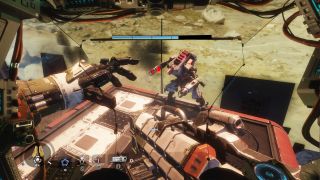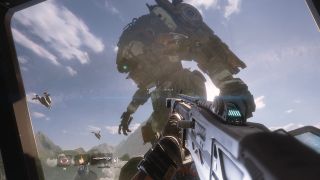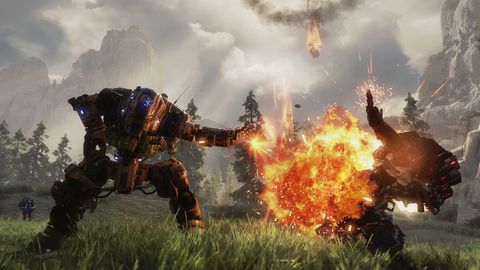Our Verdict
A brilliant singleplayer campaign married to inventive, skill-intensive multiplayer that calls back to FPS classics of old.
PC Gamer's got your back
What is it? A fast-paced FPS featuring parkour, sci-fi gadgets, and massive robot battlesuits.
Expect to pay £50/$60
Developer Respawn
Publisher EA
Reviewed on Intel Core i7-6700K, Nvidia GTX 980, 16GB RAM
Multiplayer Online, up to 16 players
Link www.titanfall.com
Titanfall 2's brilliance comes as a surprise, and I say that as somebody who loved the original despite its flaws. In its first attempt, Respawn created a set of traversal, gunplay and mech combat systems that were served well by the multiplayer framework placed around them. I firmly believe that if Titanfall had been released in the late nineties, we'd be talking about its wallrunning, titan-hopping, knee-sliding combat in the same hushed terms reserved for Tribes' skiiing, or Quake's rocket jumping.
Instead, Titanfall was released in 2014. That meant it was burdened by community-sundering season passes and grinding unlock systems, bad practices that drove players away—and that have been fortunately abandoned for this sequel.
Titanfall 2 is a very different game to its predecessor, but it has led me along a similar line of thought. If this were a game from the late nineties or early noughties, we'd likely look back at the mission 'Effect and Cause' as one of the greats of the genre, the sort of one-off statement of imagination and execution that you think of when you consider BioShock's Fort Frolic, Thief 3's Cradle, or—and I can't believe I'm about to make this comparison—Half-Life 2's We Don't Go To Ravenholm. It's that good. I know—I'm surprised too.

That one act really is a spectacular jewel in the game's crown, and it's remarkable because it's a self-contained experience. Titanfall 2 takes notes from the way that Valve structured the Half-Life series: each section introduces a set of ideas, escalates them quickly, and then moves on from them just as fast. As a result there's a lot packed into the 6-7 hours it will take you to finish the campaign, with each section finding its own way to surprise you.
You'll engage in a running firefight through a massive factory that is throwing prefab colony buildings together around you as you go. You'll perform a beachhead landing alongside a phalanx of allied titans. You'll engage in mech duels against a cast of mercenary titan pilots pulled straight from an eighties action movie. And in Effect and Cause you'll... well, I won't spoil it.
If there's anything holding Titanfall 2 back, it's that not all of its chapters are created equal. It has some good ideas, some great ideas, and one brilliant idea. And because of Respawn's (otherwise laudable) willingness to drop an idea when they've used it up, you might find yourself wishing that some of these high concepts stuck around longer than others. Even during its less-inspired moments, however, the worst it gets is 'very good shooter with very big robots'.
Titanfall 2 is built on rock-solid foundations. There's loads of weapons to try, from SMG staples to powerful shotgun pistols to gravity grenades and remote satchel charges. These feel and sound phenomenal—Respawn's legacy as Infinity Ward, the people who invented Call of Duty, is sensed in the simple kinetic pleasure of putting a target in your red-dot sight and pulling the trigger.
This is coupled with the series' brilliant traversal system, which spans double jumps, wall-runs, slides, and powerful melee strikes. Shooting is a form of punctuation in Titanfall—it's through movement that you really express yourself, to the point that resorting to boring old running on the ground can feel like failure. You've also got a short-duration cloaking device, gated by a cooldown, that allows you to reposition in dangerous situations without needing to stop and hide.
In a sense, Titanfall 2 uses cloaking and your freedom of movement to stand in for the bullet-sponge healthbar usually granted to first person shooter protagonists. On the hardest difficulty setting you can't actually take very much fire before you die: it's fundamentally a game about not taking any fire at all. You are the three-way lovechild of B.J. Blazkowicz, the Predator, and Faith from Mirror's Edge. Try not to think about that too much. Also, a robot is your best friend.
For an assessment of how Titanfall 2 runs on both midrange and high-end PC hardware, check out our analysis of how it performs.
If you're building a new PC, also take a look at our mid-range and high-end build guides. Read our affiliates policy here.
The story is above-average triple-A action fare, punching above its weight in terms of spectacle and managing to fit in a few decent jokes amidst the battle-talk. The central dynamic between protagonist Jack Cooper and the titan he is unexpectedly bonded with, BT, is perfectly enjoyable—The Iron Giant with killstreaks. It might not stick with you long after the credits roll, but the strength of the campaign as a whole is enough to make me want to spend more time in this world, to find out what other unexpected ingredients Respawn can introduce to the formula of man plus robot plus guns plus parkour.
If Titanfall 2's singleplayer surprises with quality, then multiplayer surprises with the amount that has changed since the first game. All of the same ideas return, from freerunning pilots to titan calldowns to NPC minions and limited-use power spikes, but each has been rethought. It is as if Respawn laid out Titanfall on a table, took it to pieces, and figured out how to create a new game with the same essential parts.
It's extremely fast-paced and highly lethal, with grappling hooks, speed boosts and phase-shift abilities raising the skill ceiling of movement. An old-school degree of finesse is possible here, and when you watch from the perspective of a good player—usually via the kill cam after they've killed you—you'll realise just how much skill it's possible to express by carefully chaining slides, jumps and wall-runs. Think Tribes.

There are familiar point-capture, deathmatch and titan warfare modes, though many of these feature tweaks that take a little getting used to. One example is Bounty Hunt, a combination of deathmatch, marked target hunting and point-capture that sees teams race to collect bounties and deposit them in periodically-available banks. It's a little overcomplicated, but impressive in that it crams almost all of Titanfall's competitive structures into a single mode.
Capture The Flag is a favourite, but best with a team of friends. Titanfall's systems are perfect for CTF, a mode that has gone out of favour among developers in favour of less teamplay-intensive forms of competition. I'm glad that Respawn chose to move against the current. I've called in titans to disrupt the enemy's defenders ahead of a flag-run and given chase to a fleeing capper with grappling hook and jetpack. I have always preferred this type of teamplay to pure deathmatch or the map-spanning grind of Battlefield.
In Titanfall, every player matters and every system encourages teamwork. The old concept of 'rodeo'—where a player can mantle an enemy titan to cripple them—has been reworked. Now, leaping on a titan causes you to rip out their battery, disrupting their shield and exposing them to further damage (on a second leap, you'll drop a grenade down the battery hole.) It goes deeper than that, however: batteries are kept by the pilot that took them, and can be plugged into allied titans that have lost their batteries to repair them.
I love this kind of design because it adds depth to competitive play while reliably creating memorable moments. During one close game I yelled at a friend to not eject from his doomed titan because I had a battery—I could save him! Grappling up the side of a building and wall-running onto his hull as he withdrew from the line of fire, I felt like a hero. I have also disembarked from my titan, chased down and killed the player who took my battery, and plugged it back in—thank you very much. It felt like getting revenge on a mugger.
There's an unlock system, but it's well-conceived and very generous. You're always being showered with new stuff, and it's as lizard-brain-tickling as you'd expect. You can access level-restricted unlocks early with an upgrade currency, and you're even given a stock of it the first time you log in. This is very welcome, allowing you to pick your favourite titans straight away if you don't want to wait.
There are also cosmetic items of every sort, from logos to animations to gun skins to titan skins and so on and so on. Remarkably, though, Titanfall 2 has no microtransactions and no season pass. There are many hooks for the former to be added later, but they've guaranteed that all future maps and modes will be free—this is a big deal, because the community-dividing impact of the first game's season pass accelerated the loss of its player population.

Respawn has done everything it can to avoid that fate this time, from forgoing exorbitant extra fees to packing in a best-in-class singleplayer campaign. I would not be surprised if we look back on Titanfall 2 as one of the best shooters of its time. I'm concerned, however, that we'll also remember it as an underground favourite rather than the hit it deserves to be. It'd be such a shame if Titanfall failed to retain its audience again, simply because it came out between Battlefield and Call of Duty.
There's a danger of that, however, and that danger affects the value proposition of Titanfall 2's excellent multiplayer in the months to come. But it doesn't change a thing about the singleplayer experience. This is a game that takes some of the most familiar vocabulary in this hobby—run, jump, shoot, spaceship, robot, alien dog—and finds ways to surprise you with each. When it comes down to it, that's what Titanfall 2 deserves to be remembered for.
A brilliant singleplayer campaign married to inventive, skill-intensive multiplayer that calls back to FPS classics of old.
Joining in 2011, Chris made his start with PC Gamer turning beautiful trees into magazines, first as a writer and later as deputy editor. Once PCG's reluctant MMO champion , his discovery of Dota 2 in 2012 led him to much darker, stranger places. In 2015, Chris became the editor of PC Gamer Pro, overseeing our online coverage of competitive gaming and esports. He left in 2017, and can be now found making games and recording the Crate & Crowbar podcast.


